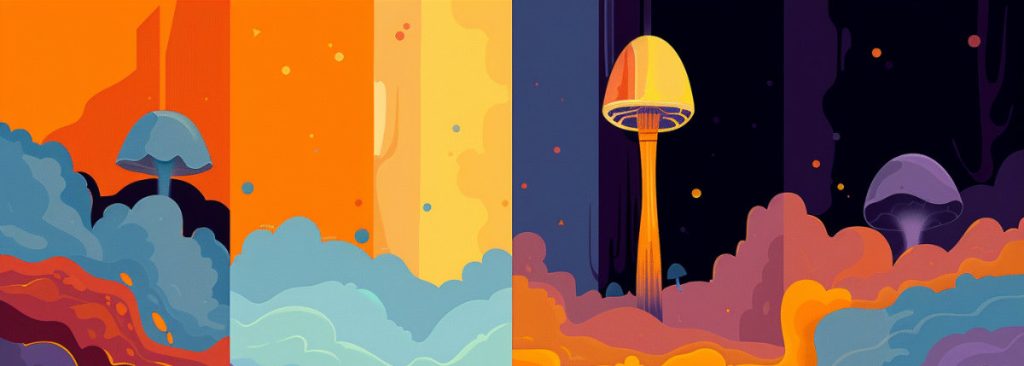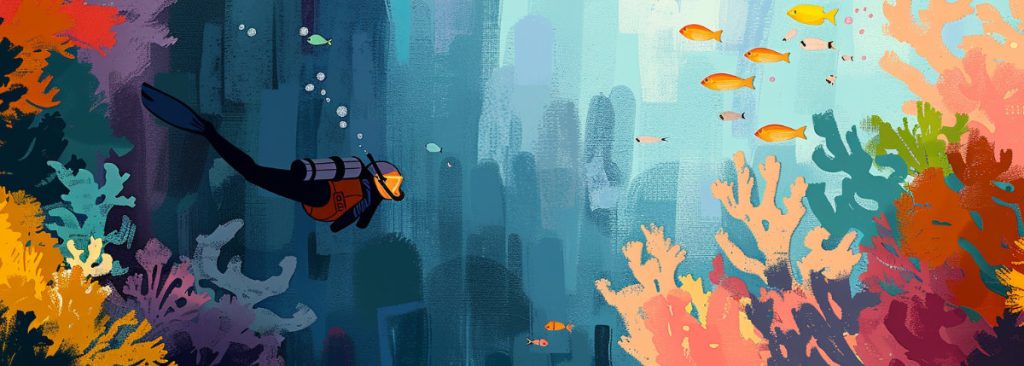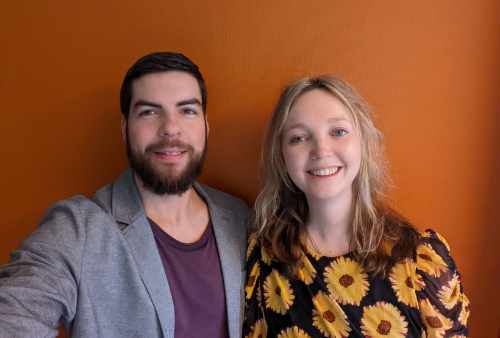Psychedelics are powerful mind enhancers that have been used by people for centuries for various purposes.
In many cultures around the world, psychedelic plants and mushrooms are used in rituals to promote health, strengthen social bonds and connect to the spiritual. These traditional practices demonstrate that psychedelics have long played a role in human life.
In the West, the modern history of psychedelics began with the discovery of LSD by Albert Hofmann in 1943. This led to much interest and research into the potential of these substances, both for expanding consciousness and for medical applications. Unfortunately, this research was halted for a long time due to the ban on psychedelics. But nowadays, there is a revival, and psychedelic research is once again in the spotlight.
You could say that psychedelics are like binoculars for the mind. They allow you to see the world and yourself in a new, expanded way, just as binoculars allow you to see things you cannot see with the naked eye. And like binoculars, psychedelics can be a valuable tool if you use them with care and expertise.

Traditional Use of Psychedelics by Indigenous Cultures
The history of psychedelics goes back much further than the discovery of LSD in the 20th century. Traditional cultures around the world have thousands of years of experience using psychedelic plants and mushrooms.
Take, for example, the Mazatec Indians in Mexico. They have a long tradition of rituals involving psilocybin mushrooms, which they call “meat of the gods.” For them, these mushrooms are a sacred sacrament used for healing, insight and spiritual growth. The mushrooms are treated with great respect and only used under the guidance of experienced shamans.
Another example is the ayahuasca ceremonies in the Amazon region. Ayahuasca is a psychedelic drink made from two plants that has been used by indigenous tribes for centuries. The ceremonies are led by experienced ayahuasqueros and are intended to bring physical, emotional and spiritual healing. Participants often report deep insights, emotional breakthroughs and mystical experiences.
You could say that traditional psychedelic rituals work as a kind of psychological and spiritual ‘reset’. Just as you sometimes have to restart your computer to resolve stuck programs, psychedelics can help you release ingrained patterns in the mind and look at life with fresh eyes. Under expert guidance, they can be a powerful tool for personal growth and transformation.
The rediscovery of psychedelics in Western science has led to much fascinating research, confirming the potential of these substances for both therapeutic and spiritual purposes.

The Rediscovery of Psychedelics in Modern Scientific Research
Back in the West, research began again in the early 21st century. A groundbreaking study at Johns Hopkins University examined the effects of psilocybin (the active compound in ‘magic mushrooms’) on healthy volunteers. Participants were given psilocybin in a carefully supervised setting. More than 60% of them later described the experience as one of the most meaningful experiences of their lives, comparable to the birth of a child or the death of a parent. Many participants reported lasting increases in well-being, life satisfaction and openness.
Other research has shown that psilocybin may hold promise for treating depression, anxiety, addiction and other mental health conditions. In a recent study with terminally ill cancer patients, a single dose of psilocybin helped to dramatically reduce their depression and anxiety, an effect that lasted for weeks to months. For many patients, the experience led to a deeper acceptance and peace with the end of life.
Psilocybin seems to work as a kind of ‘psychological lubricant’. It helps loosen rigid thought patterns, soothe old emotional wounds, and make the mind flexible and adaptive again. Just as a stalled machine starts running again when you administer the right lubricating oil, psilocybin can stimulate the psyche’s self-healing capacity.
Both the rich history of traditional use and the growing scientific evidence suggest that psychedelics can be versatile tools for healing, growth and consciousness expansion when used with respect and expertise.

Responsible Use and Guidance for Psychedelic Experiences
Psychedelics have a rich history of traditional use and modern research. They offer unique opportunities to explore and expand our consciousness. As powerful “mind tools,” they deserve careful study and responsible use.
Psilocybin-containing truffles are a specific type of psychedelic that is popular these days, but it’s important to be well-informed before deciding to try them.
Imagine you are interested in trying psilocybin truffles. You may have heard positive stories from friends or read online about the possible benefits. But you also know that it’s not a decision to make lightly. Before you take the plunge, you want to find out as much as possible about what to expect, both the risks and the benefits. Fortunately, there is more and more good information available these days.
Trying psychedelics for the first time can be compared to learning to dive. It opens the door to a fascinating new world, but it’s not something you do without preparation. You first want to take a good diving course, so that you know how to work safely. Likewise, it is essential to prepare thoroughly before taking the plunge with psilocybin truffles.
If you are considering trying psilocybin truffles, first gather as much reliable information as possible. Make sure you understand the risks and impacts and how to create the best possible experience. A considered, well-informed approach is key.
At FLO Coaching, we offer guided psilocybin truffle sessions, supported by experienced coaches. If you have any questions or are looking for help preparing your first psychedelic experience, please feel free to contact us. We are happy to introduce you to the fascinating world of expanding consciousness in a responsible way. This is how we guide you towards a new phase of holistic health and well-being.
Frequently Asked Questions About The History Of Psychedelics
Psychedelic plants and mushrooms have been used for thousands of years in rituals and ceremonies by indigenous cultures around the world, from the Mazatec Indians of Mexico to the tribes of the Amazon.
A well-known example is the ayahuasca ceremonies in the Amazon region. Ayahuasca is a psychedelic drink that has been used for centuries by indigenous tribes for healing, insight and spiritual growth. The ceremonies are led by experienced shamans.
The modern history of psychedelics in the West began with the discovery of LSD by Swiss scientist Albert Hofmann in 1943. This led to much interest and research into the potential of psychedelics in psychiatry and psychology.
Unfortunately, promising research into psychedelics was halted for a long time due to the banning of these substances in the 1960s and 1970s. Only in recent decades has there been a resurgence of scientific interest in the therapeutic and spiritual potential of psychedelics.
Studies have shown that psilocybin, under supervised conditions, can lead to profound mystical experiences, lasting increases in well-being and openness, and relief from depression, anxiety and existential suffering in terminally ill patients.
You could say that psychedelics work as a kind of ‘psychological lubricant’, loosening rigid thought patterns, dissolving emotional blockages and making the mind flexible and adaptive again. They can be a powerful tool for personal growth and transformation.
By combining the rich experiential knowledge from traditional cultures with careful scientific study, we can develop a holistic approach that optimizes the safety and effectiveness of psychedelics. Traditional practices provide valuable insights into creating a supportive context and guiding deep inner experiences.
An influential study at Johns Hopkins University examined the effects of psilocybin on healthy volunteers. Many participants described the guided psilocybin experience as one of the most meaningful experiences of their lives, leading to lasting improvements in well-being and life satisfaction.
Research suggests that psilocybin could be effective in treating depression, anxiety disorders, addictions and existential suffering in people with terminal illnesses. Psilocybin appears to stimulate psychological self-regulatory capacity and help resolve emotional blockages.
Trying psychedelics is like learning to scuba dive – it opens the door to a fascinating new world but requires careful preparation and guidance to minimize risks and promote positive experiences. By thoroughly informing yourself and creating a supportive context, you increase the chance of a safe and valuable experience.


